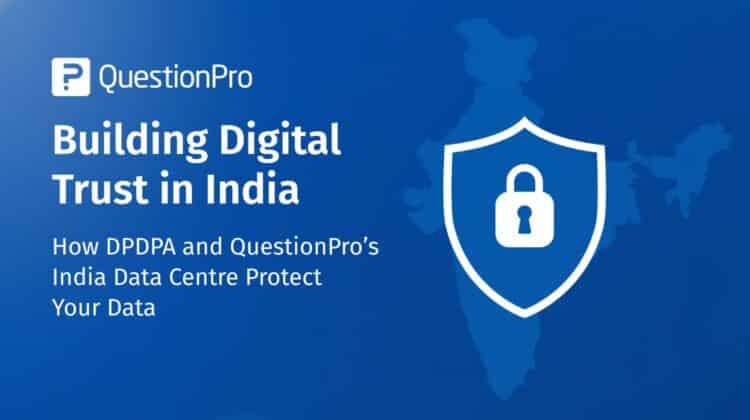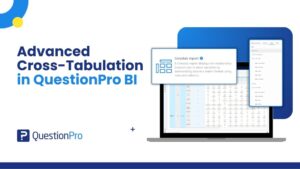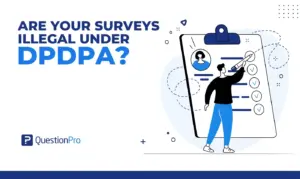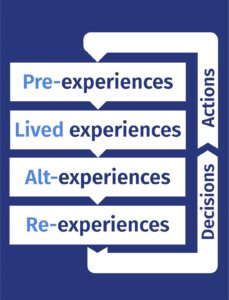
India’s digital ecosystem is expanding rapidly, and with it, the volume of personal data being collected through surveys, apps, feedback programs, and online interactions. People today want more than convenience, they want clarity and confidence in how their data is handled. They want to know who holds their data, where it is stored, and whether it is protected. Let’s dive deeper into the Digital Personal Data Protection Act (DPDPA) that is shaping a safer, more secure digital future for India.
To support this privacy-first shift, India introduced the Digital Personal Data Protection Act (DPDPA). At the same time, businesses are actively looking for platforms that can help them remain compliant and build trust. In response, QuestionPro has launched its dedicated India Data Centre, offering secure local hosting and stronger alignment with Indian privacy expectations.
Understanding the DPDPA
The DPDPA is India’s most comprehensive data privacy law. It governs how personal data is collected, processed, stored, and shared.
It applies to:
- Organizations operating within India
- Organizations outside India handling data related to Indian users
This makes it relevant to:
- Enterprises and SMBs
- Public and private institutions
- Startups and global companies
- Any organization collecting personal or identifiable data
If you gather customer information, employee data, research responses, or feedback, the DPDPA matters to you.
The Core Principles of DPDPA
The law is built on seven guiding principles that shape ethical data use:
- Consent First – Data must be collected with clear and informed consent.
- Purpose Limitation – Data can only be used for the purpose stated upfront.
- Data Minimization – Collect only what is necessary, nothing more.
- Accuracy & Safeguarding – Data must be correct and protected.
- Storage Limitation – Data should not be kept longer than needed.
- User Rights – Individuals can access, correct, withdraw, or request deletion.
- Accountability – Organizations must show compliance and handle grievances.
These principles shift control toward the individual, not the organization.
What Happens If Companies Don’t Comply?
DPDPA introduces serious consequences. Penalties can reach ₹250 crore in cases of violations, breaches, or failure to uphold rights.
Non-compliance risks include:
- Financial losses
- Reputational damage
- Customer distrust
- Operational setbacks
In today’s market, privacy is not optional but it influences business continuity and credibility.
The Rise of Data Localization in India
There is growing emphasis on storing data within the country. Organizations and users want more transparency and assurance that personal information remains under Indian jurisdiction.
This shift is driven by:
- Regulatory requirements
- Security and governance priorities
- Faster access and reduced latency
- Better auditability
- Higher customer confidence
Sectors especially impacted include:
- BFSI and fintech
- Healthcare
- Retail and e-commerce
- IT and SaaS
- Manufacturing
- Government and education
More than ever, users want a clear answer to: “Where is my data stored?”
QuestionPro’s India Data Centre: A Major Milestone
To meet this need, QuestionPro has launched a dedicated India Data Centre. It ensures that data collected through surveys, research, customer experience programs, or employee feedback stays within India.
Key benefits include:
- Local data hosting
- Higher trust and transparency
- Improved speed and performance
- Stronger alignment with governance and compliance needs
This is especially important for organizations that require Indian data residency due to legal, contractual, or policy-driven mandates.
How QuestionPro Supports DPDPA Compliance
While companies remain responsible for their own compliance, QuestionPro provides tools that make DPDPA alignment practical and manageable.
Platform Capabilities Include:
- Consent Management
- Display notices
- Capture explicit consent
- Record opt-ins and opt-outs
- User Rights Support
- Access to personal data
- Correction requests
- Deletion and withdrawal options
- Data Minimization
- Customizable fields
- Purpose-driven collection
- Audit Trails
- Logs of access, actions, and changes
- Incident Response
- Monitoring
- Defined protocols
- Timely escalation
These features help organizations operationalize compliance rather than just understand it.
Security Built Into Every Layer
Security is central to QuestionPro’s platform and infrastructure. The India Data Centre follows enterprise-grade protection standards.
Key Security Measures:
- Encryption at rest and in transit
- Role-based access controls
- Multi-factor authentication
- VAPT-tested systems
- Firewalls and network protection
- Backups and disaster recovery
- Continuous monitoring
Rather than treating security as a feature, QuestionPro embeds it into the entire ecosystem.
What This Means for Indian Organizations
With local hosting and DPDPA alignment, organizations gain several advantages:
- Higher Trust – Customers and employees are more willing to share data when they feel protected.
- Better Performance – Reduced latency improves platform speed and participation rates.
- Lower Risk – Stronger governance reduces exposure to breaches and penalties.
- Future Readiness – Infrastructure built to adapt to evolving regulations.
In feedback-driven environments like CX, HR, and research, trust directly influences participation and better participation leads to richer insights.
DPDPA as a Competitive Advantage
Privacy is becoming a differentiator. Organizations that prioritize data protection can:
- Strengthen brand credibility
- Boost participation in surveys and feedback programs
- Unlock stronger stakeholder relationships
- Build long-term customer loyalty
Trust drives engagement and engagement drives better decision-making.
Why QuestionPro Is the right partner for India
With decades of global experience and a strong presence in India, QuestionPro brings together:
- Local data hosting
- Strong security controls
- Scalable technology
- Transparent practices
- Regulatory alignment
The India Data Centre represents not just an infrastructure upgrade, but a commitment to India’s privacy-first future.
A Privacy-Led Future Starts Now
As DPDPA rolls out, organizations will need partners who support compliance, sovereignty, and trust. With its India Data Centre, QuestionPro helps businesses operate confidently while respecting user rights and data protection standards.







